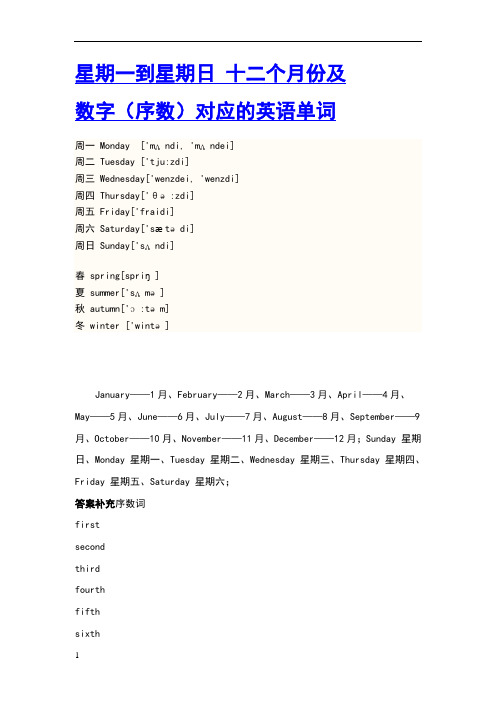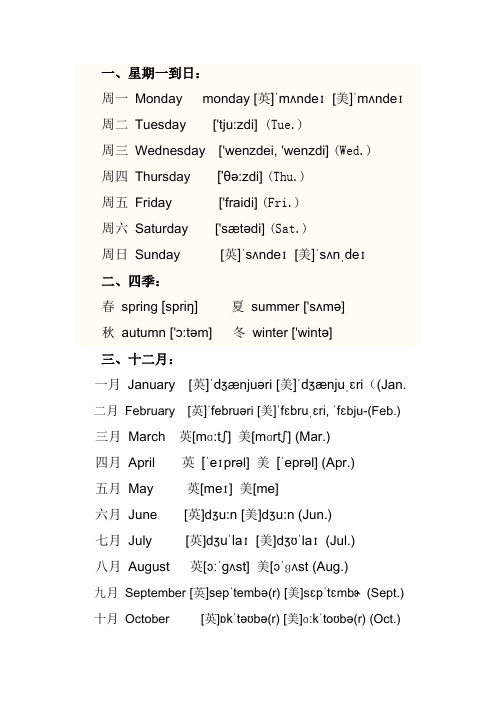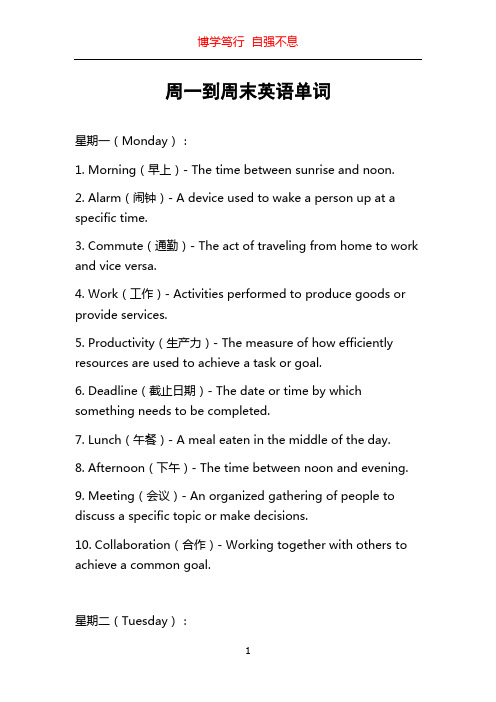星期一的英语单词
英语单词日期

星期星期一:Mon.=Monday 星期二:Tues.=Tuesday 星期三:Wed.=Wednesday星期四:Thur.=Thursday 星期五:Fri.=Friday星期六:Sat.=Saturday 星期天:Sat.=Sunday月份一月份=JAN. Jan.=January 二月份=FEB. Feb.=February三月份=MAR. Mar.=March 四月份=APR. Apr.=April五月份=MAY May=May 六月份=JUN. Jun.=June七月份=JUL. Jul.=July 八月份=AUG. Aug.=August九月份=SEP. Sept.=September 十月份=OCT. Oct.=October十一月份=NOV. Nov.=November 十二月份=DEC. Dec.=December一月January:记忆:“箭”;记忆说明:January音头类似“箭”,另外“1”的形状也象“箭”;二月February:记忆:新春“飞吧” ;记忆说明:February音头类似“飞吧”;二月是立春,一般也是春节所在的月份,这个月学生们都放寒假了,都要“飞吧”,飞回家玩去了呢;也可以联想一年之计在于春,新春伊始,就开始“飞吧”;三月March:记忆:三八是“妈妈和妻子”的节日;记忆说明:March发音象“妈妻”;三月有妇女节,对小孩来说,那是“妈”的节日,对于孩子他爸来说,那是“妻”的节日;四月April:记忆:“Apple”;记忆说明:词头Ap与苹果Apple开头一样,发音也有点类似,想象四月是吃“苹果”的日子;五月May:记忆:劳动“美”;记忆说明:May的发音类似“美”;五月有劳动节,劳动最光荣,劳动最“美”;另外,May 也是“可以”的意思,联想劳动“可以”使人变“美”丽;六月June:记忆:儿童节一起“聚呢”;记忆说明:June与汉语“聚呢”ju ne是一样的;六月有儿童节,孩子们肯定会在节日里高兴地过节、聚“聚呢”;七月July:记忆:暑假“就来”;记忆说明:July发音类似“就来”;这个月学生要放暑假了,盼望已久的暑假“就来”啦;八月August:记忆:秋天“Autumn”记忆说明:August词头与Autumn开头Au是一样的;八月立“秋”,秋天到了,所以八月与秋天Autumn有相似之处;九月September:记忆:九月“Student”上“School”;记忆说明:九月是S字母开头,学生和学校Student、School也是S开头;暑假结束了,September是Student到School的日子;十月October:记忆:国庆节玩“气球”——“我可投吧”记忆说明:十月October是O开头,单词中间也还有个O字母;十月有国庆节,气球满天飞,气球的形状象“O”;并且,October的发音象“我可投吧”,就可以进一步联想拿着“气球”投掷玩,“我可投吧”十一月November:记忆:冬天“No温”度;记忆说明:十一月的音头类似“No温”;十一月立冬,冬天来了,当然没有温度啦;十二月December:记忆:一年到“底”了;记忆说明:十二月December的音头类似“底”,因为十二月是一年的最后一个月,到“底”了詹妞January和凡伯February去马齿山March旅行,四月遇见了太阳神阿波罗April,娶了一位妩媚May的新娘,带了两个丫头刘朱恩June和戚朱来July,发了奥哥斯August的财;后来,生了儿子sonSeptember,October,November,叫迪塞波December;过去常常做某事used to do sth 习惯于做某事be used to doing sth被用于做某事情be used to do sth I hope that I can现在时begin to do和begin doing可以互换,但在以下三种情况下,用to dodoing 一般有正在做的意思 to do一般有正准备做的意思refusal n.拒绝; 优先取舍权material,physical, spiritual,moral道德的, 精神上的not better than表示"不比…好",即前者不如后者;例:His English is nobetter than mine.他的英语同我的英语一样不好;此外,no better than还有"几乎等于,简直是"之意;例:The answer is no better than refusal.这个回答简直是拒绝I‘m stronger than him. my dog is stronger than his.。
星期一到星期日、月份及数字的英语单词

星期一到星期日十二个月份及数字(序数)对应的英语单词周一Monday ['mʌndi, 'mʌndei] (Mon.)周二Tuesday ['tju:zdi] (Tue.)周三Wednesday ['wenzdei, 'wenzdi] (Wed.)周四Thursday ['θə:zdi] (Thu.)周五Friday ['fraidi] (Fri.)周六Saturday ['sætədi] (Sat.)周日Sunday ['sʌndi] (Sun.)春spring [spriŋ]夏summer ['sʌmə]秋autumn ['ɔ:təm]冬winter ['wintə]序数词第一first 第二second 第三third 第四fourth 第五fifth第六sixth 第七seventh 第八eighth 第九ninth 第十tenth 第十一eleventh 第十二twelfth 第十三thirteenth ...第十八eighteenth 第十九nineteenth 第二十twentieth第二十一twenty-first 第四十fortieth 第五十fiftieth 第八十eightieth第九十ninetieth 一百one hundredth ...以此类推很简单的,1作个位除11外加ST,2作个位除12外加ND,3作个位加RD,其余都加TH•一月January ((Jan.)二月February (Feb.)三月Marcy (Mar.)四月April (Apr.)五月May六月June (Jun.)七月July (Jul.)八月August (Aug.)九月September (Sept.)十月October (Oct.)十一月November (Nov.)十二月December (Dec.)。
英语星期月份一到一百单词

星期一:Monday [mʌndei] 星期二:Tuesday [tju:zdei]星期三:Wednesday [wænsedi] 星期四:Thursday [θə:zdei] 星期五:Friday [fraidei] 星期六:Saturday [sætədei] 星期天:Sunday [[sʌndei]January (Jan.) 一月;February (Feb.) 二月;March (Mar.) 三月;April (Apr.) 四月;May (may.)五月;June(Jun.)六月;July(Jul.)七月;August(Aug.)八月;September(Sept.)九月;October(Oct.)十月;November(Nov.)十一月;December(Dec.)十二月 .1 (one)2 (two)3 (three)4 (four)5 (five)6 (six)7 (seven)8 (eight)9 (nine) 10 (ten) 11 (eleven) 12 (twelve) 13 (thirteen) 14 (fourteen)15 (fifteen) 16 (sixteen) 17 (seventeen) 18 (eighteen) 19 (nineteen)20 (twenty) 21 (twenty-one) 22 (twenty- two) 23 (twenty- three)24 (twenty- four) 25 (twenty- five) 26 (twenty- six) 27 (twenty- seven)28 (twenty- eight) 29 (twenty- nine) 30 (thirty) 31 (thirty- one)32 (thirty- two) 33 (thirty- three) 34 (thirty- four) 35 (thirty- five) 36 (thirty- six) 37 (thirty- seven) 38 (thirty- eight) 39 (thirty- nine) 40 (forty) 41 (forty- one) 42 (forty- two) 43 (forty- three)44 (forty- four) 45 (forty- five) 46 (forty- six) 47 (forty- seven)48 (forty- eight) 49 (forty- nine) 50 (fifty) 51 (fifty- one)52 (fifty- two) 53 (fifty- three) 54 (fifty- four) 55 (fifty- five)56 (fifty- six) 57 (fifty- seven) 58 (fifty- eight) 59 (fifty- nine)60 (sixty) 61 (sixty- one) 62 (sixty- two) 63 (sixty- three)64 (sixty- four) 65 (sixty- five) 66 (sixty- six) 67 (sixty- seven)68 (sixty- eight) 69 (sixty- nine) 70 (seventy) 71 (seventy- one)72 (seventy- two) 73 (seventy- three) 74 (seventy- four)75 (seventy- five)76 (seventy- six) 77 (seventy- seven) 78 (seventy- eight) 79 (seventy- nine)80 (eighty) 81 (eighty- one) 82 (eighty- two) 83 (eighty- three)84 (eighty- four) 85 (eighty- five) 86 (eighty- six) 87 (eighty- seven)88 (eighty- eight) 89 (eighty- nine) 90 (ninety) 91 (ninety-one)92 (ninety- two) 93 (ninety- three) 94 (ninety- four) 95 (ninety- five)96 (ninety- six) 97 (ninety- seven) 98 (ninety- eight) 99 (ninety- nine)100 (hundred)。
英语单词日期

星期星期一:Mon.=Monday星期二:Tues.=Tuesday星期三:Wed.=Wednesday星期四:Thur.=Thursday星期五:Fri.=Friday星期六:Sat.=Saturday星期天:Sat.=Sunday月份一月份=JAN.Jan.=January二月份=FEB.Feb.=February三月份=MAR.Mar.=March四月份=APR.Apr.=April五月份=MAYMay=May六月份=JUN.Jun.=June七月份=JUL.Jul.=July八月份=AUG.Aug.=August九月份=SEP.Sept.=September十月份=OCT.Oct.=October十一月份=NOV.Nov.=November十二月份=DEC.Dec.=December一月January:记忆:“箭”。
记忆说明:January音头类似“箭”,另外“1”的形状也象“箭”。
二月February:记忆:新春“飞吧”。
记忆说明:February音头类似“飞吧”。
二月是立春,一般也是春节所在的月份,这个月学生们都放寒假了,都要“飞吧”,飞回家玩去了呢。
也可以联想一年之计在于春,新春伊始,就开始“飞吧”。
三月March:记忆:三八是“妈妈和妻子”的节日。
记忆说明:March发音象“妈妻”。
三月有妇女节,对小孩来说,那是“妈”的节日,对于孩子他爸来说,那是“妻”的节日。
四月April:记忆:“Apple”。
记忆说明:词头Ap与苹果Apple开头一样,发音也有点类似,想象四月是吃“苹果”的日子。
五月May:记忆:劳动“美”。
记忆说明:May的发音类似“美”。
五月有劳动节,劳动最光荣,劳动最“美”。
另外,May也是“可以”的意思,联想劳动“可以”使人变“美”丽。
六月June:记忆:儿童节一起“聚呢”。
记忆说明:June与汉语“聚呢”(june)是一样的。
六月有儿童节,孩子们肯定会在节日里高兴地过节、聚“聚呢”。
周一到周日的英语单词

周一到周日的英语单词一周有七天,从星期一到星期日。
每一天都有它自己独特的名字,英文里用一个单词来表示,从星期一到星期日分别是Monday,Tuesday,Wednesday,Thursday,Friday,Saturday和Sunday。
以Monday为例,Monday表示“星期一”,读音为[mnde],是英文中最常用的单词之一,是七个星期之首,表示一周的第一天。
在日常生活中,我们经常会碰到Monday这个词。
例如,上班的时候,我们会说“今天是星期一,又是一个新的开始”。
校的时候,我们也经常会说“下个星期一有考试”,表示下星期一是考试日。
另外,Monday还可以用来形容某人的神态。
当有人看起来很疲惫、不开心的时候,往往会说“他今天看起来好像Monday一样”,表示他非常疲倦。
Monday一词来源于英语印欧语系中祖先语言的月事神,就是古代罗马神话中的月神“朱庇特”,也就是我们熟知的月亮之神。
在古罗马语中,朱庇特被称为“Mundus”,后来再演变成了英文中的Monday。
Tuesday:星期二Tuesday表示“星期二”,读音为[tuzde],英文中也是常用的词语,表示一周的第二天。
在日常生活中,我们也经常会用到Tuesday这个词,例如,选择一个星期里最适合去娱乐的时候,我们会说“等到星期二,要一起去打乒乓球”,表示星期二是去娱乐的时间。
另外,我们常常会说“明天是星期二,还有两天就到周末了”,表示星期五是周末假期。
Tuesday这个词来源于古代希腊语,Tiu是和太阳有关的凯尔特神,是古代希腊神话中的太阳神,后来经过一定的演变,最终成了英文中的Tuesday。
Wednesday:星期三Wednesday表示“星期三”,读音为[wnzde],也是英文中常用的词,表示一周的第三天。
在日常生活中,我们也经常会提到Wednesday这个词。
例如,上班时,我们会说“我们今天是星期三,可以有一个加班的空间”,表示星期三可以自由安排时间;另外,学校的时候,我们也常常会说“明天是星期三,放学要早些回家”,表示星期三不同于其它日子,到了晚上要提早准备回家。
星期一到星期日的英语单词怎么写

星期一到星期日的英语单词怎么写星期一到星期日的英语单词怎么写现在世界各国通用一星期七天的制度,最早由君士坦丁大帝(Constantine the Great)制定。
下面有店铺整理的星期一到星期日的英语单词,欢迎大家阅读!星期一到星期日的英语单词星期一 Monday星期二 Tuesday星期三 Wednesday星期四 Thursday星期五 Friday星期六 Saturday星期日 Sunday英文缩写星期一 MON星期二 TUE星期三 WED星期四 THU星期五 FRI星期六 SAT星期天 SUN拓展阅读古巴比伦人创立的星期制,首先传到古希腊、古罗马等地。
古罗马人就用自己信仰的神的名字来命名一周7天:Sun′s-day(太阳神日),Moon′s-day(月亮神日),Mars′s-day(火星神日),Mercury′s-day (水星神日),Jupiter's-day(木星神日),Venus′-day(金星神日),Saturn′s-day (土星神日)。
现在世界各国通用一星期七天的制度。
这个制度最早由君士坦丁大帝(Constantine the Great)制定。
他在公元321年3月7日正式宣布7天为1周,这个制度一直沿用至今。
一周7天的英文名称是Sunday(星期天)、Monday(星期一)、Tuesday(星期二)、Wednesday(星期三)、Thursday(星期四)、Friday(星期五)、Saturday(星期六)。
星期日Sunday中的sun(太阳)和星期一Monday中的`缩写了的moon(月亮)自不用说。
而星期二Tuesday是以北欧神话中的战神Tyr 命名的,而他正等于罗马神话中的Mars。
星期三Wednesday的原形其实意味Woden’s day,而商业之神Woden相当于罗马神话中的Mercury。
星期四Thursday是以雷神Thor命名的,他相当于罗马神话中的Jupiter(也即希腊神话中的Zeus)。
星期一到星期日的英语怎么说

星期一到星期日的英语怎么说一.星期一到星期日的英语Monday星期一Tuesday星期二Wednesday星期三Thursday星期四Friday星期五Saturday星期六Sunday星期日二.英语单词发音星期一Monday英音:['m?ndei]美音:['m?nde]星期二Tuesday[英][?tju:zdi][美][?tuzdi,-?de,?tjuz-]星期三Wednesday[英][?wenzdi][美][?w?nzdi,-?de]星期四Thursday[英][?θ?:zdi][美][?θ?zdi,-?de]星期五Friday[英][?fraidi][美][?fra?di,-?de]星期六Saturday[英][?s?t?di][美][?s?t?di,-?de]星期日Sunday[英][?s?ndi][美][?s?ndi,-?de]三.英语单词缩写星期一:Monday(Mon)星期二:Tuesday(Tues)星期三:Wednesday(Wed)星期四:Thursday(Thurs)星期五:Friday(Fri)星期六:Saturday(Sat)星期日:Sunday(Sun)四.星期一到星期日的由来1、Monday星期一据西方传说,Monday的意思是moon'sday(属于月亮的日子),因为西方人把这一天献给月之女神。
古时候西方人相信,月的盈亏会影响农作物的生长,也会影响医疗。
此外,尚有所谓的BlueMonday。
Blue是「忧郁」的意思。
星期一是一周工作的开始,没得玩了,所以心情不好,不少国家将星期一当作familywashday(家庭洗濯日),那是由来已久的习俗。
2、Tuesday星期二Tuesday是由古英文字Tiw演变来的。
Tiw是北欧神话里的战神,所以星期二是Tiw'sday,也就是属于战神的日子,他同罗马神话里的战神Mars一样。
在北欧神话中不叫Tiw而叫Tyr。
星期一到星期日、月份及数字相对应的英语单词

星期一到星期日十二个月份及数字(序数)对应的英语单词周一 Monday ['mʌndi, 'mʌndei]周二 Tuesday ['tju:zdi]周三 Wednesday['wenzdei, 'wenzdi]周四Thursday['θə:zdi]周五 Friday['fraidi]周六 Saturday['sætədi]周日 Sunday['sʌndi]春 spring[spriŋ]夏 summer['sʌmə]秋 autumn['ɔ:təm]冬 winter ['wintə]January——1月、February——2月、March——3月、April——4月、May——5月、June——6月、July——7月、August——8月、September——9月、October——10月、November——11月、December——12月;Sunday 星期日、Monday 星期一、Tuesday 星期二、Wednesday 星期三、Thursday 星期四、Friday 星期五、Saturday 星期六;答案补充序数词firstsecondthirdfourthfifthsixthseventheighthninthtentheleventhtwelfththirteenthfourteenthfifteenthsixteenthseventeentheighteenthnineteenthtwentieth以此类推很简单的,1作个位除11外加ST,2作个位除12外加ND,3作个位加RD,其余都加TH一月 January二月 February三月 Marcy四月 April五月 May六月 June七月 July八月 August九月 September十月 October十一月 November十二月 DecemberSunday(星期天)、Monday(星期一)、Tuesday(星期二)、Wednesday(星期三)、Thursday(星期四)、Friday(星期五)、Saturday(星期六)。
星期一到星期日、月份及数字的英语单词

一、星期一到日:周一Monday monday [英]ˈmʌndeɪ[美]ˈmʌndeɪ周二Tuesday ['tju:zdi] (Tue.)周三Wednesday ['wenzdei, 'wenzdi] (Wed.)周四Thursday ['θə:zdi] (Thu.)周五Friday ['fraidi] (Fri.)周六Saturday ['sætədi] (Sat.)周日Sunday [英]ˈsʌndeɪ[美]ˈsʌnˈdeɪ二、四季:春spring [spriŋ] 夏summer ['sʌmə]秋autumn ['ɔ:təm] 冬winter ['wintə]三、十二月:一月January [英]ˈdʒænjuəri [美]ˈdʒænjuˈɛri((Jan. 二月February [英]ˈfebruəri [美]ˈfɛbruˈɛri, ˈfɛbju-(Feb.) 三月March 英[mɑ:tʃ] 美[mɑrtʃ] (Mar.)四月April 英[ˈeɪprəl] 美[ˈeprəl] (Apr.)五月May 英[meɪ] 美[me]六月June [英]dʒu:n [美]dʒu:n (Jun.)七月July [英]dʒuˈlaɪ[美]dʒʊˈlaɪ(Jul.)八月August 英[ɔ:ˈgʌst] 美[ɔˈɡʌst (Aug.)九月September [英]sepˈtembə(r) [美]sɛpˈtɛmbɚ(Sept.) 十月October [英]ɒkˈtəʊbə(r) [美]ɑ:kˈtoʊbə(r) (Oct.)十一月November [英]nəʊˈvembə(r) [美]noʊˈvembə(r (Nov.) 十二月December [英]dɪˈsembə(r) [美]dɪˈsɛmbɚ(Dec.)五、东西面北:北:north英[nɔ:θ] 美[nɔrθ],南:south英[saʊθ] 美[saʊθ],东:east英[i:st] 美[i:st]西:west英[west] 美[wɛst四、人称代词主宾格、物主代词、反身代词、所有格1、人称代词是表示"我"、"你"、"他"、"她"、"它"、"我们"、"你们"、"他们"的词。
周一到周末英语单词

周一到周末英语单词星期一(Monday):1. Morning(早上)- The time between sunrise and noon.2. Alarm(闹钟)- A device used to wake a person up at a specific time.3. Commute(通勤)- The act of traveling from home to work and vice versa.4. Work(工作)- Activities performed to produce goods or provide services.5. Productivity(生产力)- The measure of how efficiently resources are used to achieve a task or goal.6. Deadline(截止日期)- The date or time by which something needs to be completed.7. Lunch(午餐)- A meal eaten in the middle of the day.8. Afternoon(下午)- The time between noon and evening.9. Meeting(会议)- An organized gathering of people to discuss a specific topic or make decisions.10. Collaboration(合作)- Working together with others to achieve a common goal.星期二(Tuesday):1. Breakfast(早餐)- The first meal of the day, usually eaten in the morning.2. Email(电子邮件)- A digital message sent and received through an electronic communication system.3. Presentation(演示)- A visual or verbal display of information or ideas.4. Training(培训)- The process of teaching and learning specific skills or knowledge.5. Project(项目)- A planned undertaking with specific goals and timelines.6. Deadline(截止日期)- The date or time by which something needs to be completed.7. Teamwork(团队合作)- The collaborative effort of a group of individuals to achieve a common goal.8. Efficiency(效率)- The ability to accomplish a task with minimum time and effort.9. Problem-solving(解决问题)- The process of finding solutions to difficulties or challenges.10. Happy hour(欢乐时光)- A period of time, usually in the late afternoon or early evening, where drinks are offered at discounted prices.星期三(Wednesday):1. Meeting(会议)- An organized gathering of people to discuss a specific topic or make decisions.2. Agenda(议程)- A list of items to be discussed or acted upon during a meeting.3. Presentation(演示)- A visual or verbal display of information or ideas.4. Discussion(讨论)- The act of exchanging opinions or ideas among a group of people.5. Deadline(截止日期)- The date or time by which something needs to be completed.6. Break(休息)- A short period of time during which a person pauses from work or other activities.7. Planning(规划)- The process of determining the course of action to achieve specific goals.8. Decision(决策)- A choice made between different options or possibilities.9. Delegation(委托)- The transfer of authority or responsibility to another person.10. Time management(时间管理)- The process of planning and organizing one's time effectively.星期四(Thursday):1. Morning(早上)- The time between sunrise and noon.2. Deadline(截止日期)- The date or time by which something needs to be completed.3. Report(报告)- A written or spoken account of an event, situation, or investigation.4. Analysis(分析)- The process of examining something in detail to understand its components or structure.5. Feedback(反馈)- Information given to a person about their performance or behavior.6. Progress(进展)- The forward movement towards achieving a goal or objective.7. Lunch(午餐)- A meal eaten in the middle of the day.8. Afternoon(下午)- The time between noon and evening.9. Presentation(演示)- A visual or verbal display of information or ideas.10. Collaboration(合作)- Working together with others to achieve a common goal.星期五(Friday):1. Morning(早上)- The time between sunrise and noon.2. Meeting(会议)- An organized gathering of people to discuss a specific topic or make decisions.3. Brainstorm(集思广益)- The process of generating creative ideas or solutions through group discussion.4. Creativity(创造力)- The ability to think and generate original ideas or solutions.5. Break(休息)- A short period of time during which a person pauses from work or other activities.6. Networking(社交)- The act of connecting and building relationships with people for professional or social purposes.7. Afternoon(下午)- The time between noon and evening.8. Prioritization(优先级排序)- The process of determining the order in which tasks or goals should be addressed.9. Relaxation(放松)- The act of taking a break or engaging in activities that reduce stress or promote well-being.10. Weekend(周末)- The period of time between Friday evening and Sunday night, typically used for leisure and recreation.星期六和星期天(Saturday and Sunday):1. Weekend(周末)- The period of time between Friday evening and Sunday night, typically used for leisure and recreation.2. Relaxation(放松)- The act of taking a break or engaging in activities that reduce stress or promote well-being.3. Family(家庭)- A group consisting of parents and their children, living together as a unit.4. Friends(朋友)- People whom one knows, likes, and trusts.5. Hobbies(爱好)- Activities done during one's free time for enjoyment or relaxation.6. Rest(休息)- The act of ceasing work or activity to regain strength or energy.7. Netflix(在线视频平台)- A streaming service that offers a wide variety of movies, TV shows, and documentaries.8. Reading(阅读)- The act of interpreting written or printed material.9. Nature(大自然)- The physical world and its phenomena, including plants, animals, and landscapes.10. Recharge(充电)- The act of replenishing or restoring energy or vitality.。
- 1、下载文档前请自行甄别文档内容的完整性,平台不提供额外的编辑、内容补充、找答案等附加服务。
- 2、"仅部分预览"的文档,不可在线预览部分如存在完整性等问题,可反馈申请退款(可完整预览的文档不适用该条件!)。
- 3、如文档侵犯您的权益,请联系客服反馈,我们会尽快为您处理(人工客服工作时间:9:00-18:30)。
星期一的英语单词
篇一:星期一到星期日、月份及数字的英语单词
星期一到星期日十二个月份及周一Monday ['m?ndi, 'm?ndei] (Mon.)
周二Tuesday ['tju:zdi] (Tue.)
周三Wednesday ['wenzdei, 'wenzdi] (Wed.)
周四Thursday ['θ?:zdi] (Thu.)
周五Friday ['fraidi] (Fri.)
周六Saturday ['s?t?di] (Sat.)
周日Sunday['s?ndi] (Sun.)
春spring [spri?]
夏summer ['s?m?]
秋autumn['?:t?m]
冬winter ['wint?]
序数词
第一first 第二second 第三third 第四fourth第五fifth第六sixth 第七seventh 第八eighth第九ninth 第十tenth 第十一eleventh 第十二twelfth第十三thirteenth ...
第十八eighteenth第十九nineteenth第二十twentieth 第二十一twenty-first第四十fortieth第五十fiftieth第八十eightieth 第九十ninetieth 一百one hundredth ...
以此类推
很简单的,1作个位除11外加ST,2作个位除12外加ND,3作个位加RD,其余都加TH
?
一月January ((Jan.)
二月February (Feb.)
三月Marcy (Mar.)
四月April(Apr.)
五月May
六月June (Jun.)
七月July (Jul.)
八月August (Aug.)
九月September (Sept.)
十月October (Oct.)
十一月November (Nov.)
十二月December (Dec.)
篇二:星期一到星期日的英文意思
星期一到星期日的英文意思
星期日Sunday
星期一Monday
星期二Tuesday
星期三Wednesday。
